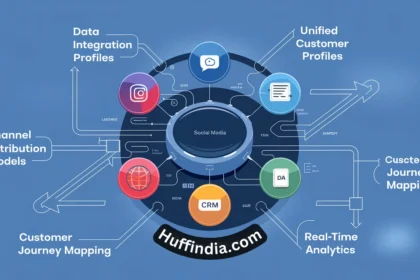In today’s digital world, artificial intelligence (AI) has become essential for online businesses. AI tools offer more than just efficiency—they also provide personalized customer interactions, improved decision-making, and greater ROI. This guide explains how you can use AI to grow your online business, giving you an edge in a competitive market.

Why Use AI for Business Growth?
AI tools help online businesses increase efficiency, personalize customer interactions, and make data-driven decisions. These advantages make AI crucial for any business aiming to stay competitive.
1. AI for Customer Service and Engagement
AI-driven chatbots and virtual assistants offer fast, 24/7 customer support. They answer inquiries quickly, improving customer satisfaction and loyalty.
- Chatbots: Platforms like Chatfuel and Intercom handle basic customer questions, freeing up your team for complex tasks.
- Personalized Recommendations: Tools like Zendesk and Drift analyze user preferences to offer personalized recommendations. This increases engagement and boosts conversions.
Example: E-commerce companies use chatbots to provide real-time assistance, such as product recommendations and order tracking. This leads to better customer experiences.
2. AI for Targeted Marketing Campaigns
AI makes digital marketing more effective. By analyzing customer data, it helps segment audiences, predict preferences, and deliver personalized content.
- Social Media Ads: Tools like AdEspresso use AI to optimize ad placement based on audience behavior and interests.
- Email Personalization: Platforms like Mailchimp use AI to determine the best times to send emails, personalize content, and automate follow-ups.
Tip: Use predictive analytics to create AI-driven email campaigns that target customer needs, maximizing engagement.
3. AI for Content Creation and SEO
AI tools boost SEO and content marketing by optimizing keywords, generating ideas, and creating engaging content.
- Content Optimization: Tools like Surfer SEO and Clearscope identify high-ranking keywords, optimize articles, and analyze competitor strategies to improve search rankings.
- Automated Content Creation: AI writers like Jasper or ChatGPT create high-quality blog posts, social media content, and product descriptions quickly.
Example: AI tools help identify trending keywords and optimize your site to attract more organic traffic.
4. AI for Inventory and Supply Chain Management
AI tools streamline inventory management, reduce stockouts, and improve supply chain operations.
- Demand Forecasting: AI-powered platforms like NetSuite predict product demand based on past data and seasonal trends, ensuring optimal inventory levels.
- Supply Chain Optimization: Tools like Llamasoft use machine learning to improve logistics, delivery routes, and supplier management.
Tip: By integrating AI, you can avoid overstocking or understocking, ensuring products are available when customers need them.
5. AI for Data Analytics and Decision Making
AI data analytics tools allow businesses to gather insights from customer behavior, sales patterns, and market trends.
- Predictive Analytics: Tools like IBM Watson and Google Analytics forecast sales trends, identify high-value customers, and predict purchase behaviors.
- Sentiment Analysis: Tools like MonkeyLearn analyze customer feedback from social media, reviews, and surveys, helping businesses gauge customer sentiment.
Example: Real-time data analysis lets businesses adapt to market changes, fine-tune strategies, and improve customer experiences.
6. AI for E-commerce Personalization
Personalization in e-commerce is essential for boosting conversions. AI tools offer unique shopping experiences tailored to each customer.
- Product Recommendations: AI recommendation engines, like Amazon’s, analyze user behavior and show relevant products.
- Dynamic Pricing: Some tools use AI to adjust product prices based on demand and competitor pricing.
Tip: E-commerce platforms can use AI to tailor shopping experiences, increasing the likelihood of sales.
7. AI for Fraud Detection and Cybersecurity
AI is vital for protecting online businesses from cyber threats. With advanced algorithms, AI can detect anomalies and respond to breaches faster than humans.
- Fraud Detection: Platforms like Forter and Sift use machine learning to prevent fraudulent transactions in real time.
- Enhanced Security: AI tools like Darktrace detect unusual behavior, flagging potential security threats before they escalate.
Example: AI-driven fraud detection tools help online businesses maintain customer trust by providing a safe shopping environment.
8. AI for Social Media Management
AI helps businesses optimize social media strategies, saving time and increasing engagement.
- Content Scheduling: Platforms like Hootsuite and Buffer let you schedule posts, optimize timing, and analyze performance.
- Audience Insights: Social media tools with AI, such as Sprout Social, analyze user demographics and preferences, refining targeting strategies.
Tip: Use AI to monitor social media engagement, improve your content calendar, and tailor posts to audience preferences.
How to Implement AI in Your Online Business
- Define Goals: Identify areas, like customer service or marketing, where AI can have the most impact.
- Choose Tools Wisely: Research AI tools that meet your business needs and budget.
- Train Your Team: Educate your team on AI practices for smooth implementation.
- Monitor Performance: Regularly assess the impact of AI tools to optimize processes.
Conclusion
Using AI tools to grow your online business is essential in today’s digital market. From personalized marketing to data analytics, AI empowers businesses to operate efficiently and make smarter decisions. Integrating AI improves customer experiences, enhances productivity, and supports long-term growth.
Embrace AI today to take your online business to new heights.


























